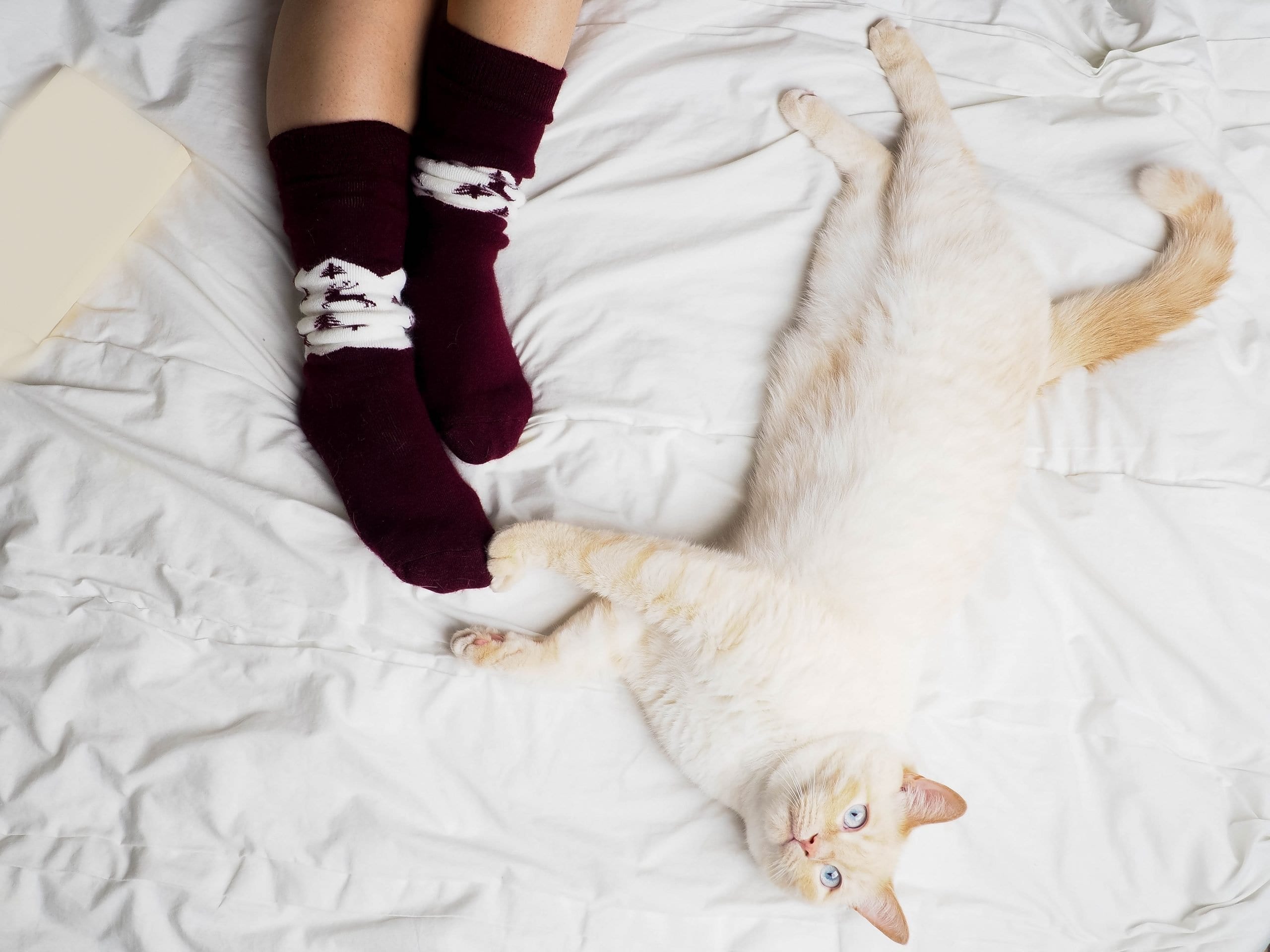One mind-blowing fact is that cats spend 70 % of their lives sleeping! Cats are one of the most fascinating and curious living creatures and as a pet owner, you must have noticed that your cat, sometimes, acts in unexpected ways! Like when they sleep. There is an entire science to our beloved small – yet very smart – creatures and to understand them we need to understand their actions. Those little signs that help us interact – and hopefully connect – better with them.
NOTE: We want to inform our blog readers that before we publish any article, the team “Proudcatowners” does deep research based on experience and knowledge about cats and everything related to them, to guarantees reliable and precise information, satisfy the readers is our first priority.
Why Does My Cat Sleep At My Feet?
Cats sleeping behavior
To understand this behavior, we need to know how cats sleep and why they need to be near us in the first place:
Cat’s average sleep is between 12-16 hours, mostly during the day while the nights will be spent wandering inside the house, an instinctive nature for this animal to shield itself from any potential predator. That amount of time takes 2\3 of your cat’s life in between deep sleep and slightly light naps and it varies depending on its environment, breed, and age. Surely, it sounds like a waste of time and life to you, but for your cat, it is the best way to be.
The weather can also affect your pet’s amount of snoozing as much as it affects you.
When it comes to sleeping areas, cats can be very impressive. Anywhere in the house is a potential rest spot, as long as it isn’t its own space on the floor.
What do we know about the sleep locations of cats in general? We know they’ll nap anywhere in the house if it’s cozy enough. We know that a narrow basket of clothes can be comfier than the little house you bought them. Your kitchen table, your doorstep, your window, and even the washing machine can be more appealing for your cat! Still, at night the only place to be is in your sleeping bed.
Why does your cat sleep with you?
Cats as all domestic animals find companionship in humans, which means trust, safety, comfort and satisfaction of needs. Your cat can suddenly become clingy to you, and other times be distant. But one common fact is that most cats enjoy sleeping at their owner’s feet.
Here are the main reasons your cat sleeps with you:
Safety
Cats are indeed predators, but weak ones. It means that the outside world poses several threats to them especially during the night.
Since your cat sleeps more during the day, if he adapts himself to your rhythm he needs to protect himself from large predators, your body would seem like the best shield.
Warmth
cats seek any place in the house where it’s warm, you must have seen your cat once or twice on the laundry basket, by the window where warm light comes in or most commonly your lap or feet. That’s because, like most creatures, cats love and seek warmth l. Any place where it’s provided, there shall they nap.
Companionship
In order to become a companion, a cat has to make a bond with its owner. Once that bond established, both parties can move on to have a life of serenity (mostly for the cat).
Marking territory

Cats are very territorial about their place of food and rest. They need to mark places to let other cats know their dominance over the marked area. Usually, they mark the same place multiple times (called patrolling) by scratching the place and rubbing it, leaving urine and feces. The territory is a very important concept to cats, therefore they can get very aggressive if it’s threatened. That applies to their marked owners. Your cat will hiss and groan if he thinks you’re ought to be in danger.
Although studies supporting this idea are very few, personal experiences are brought in many anecdotes by cat owners showing how far your cat can go to keep you for himself.
How your cat feels about you
Even if there are more cats than any other species of animals in our homes, it isn’t a domestic animal, it’s what we call a tamed animal which means, it’s doesn’t especially like humans but it can tolerate us for the sake of their survival.
“Think of your cat as your roommate…You coexist” these were the words of Professor Bertrand Deputte, doctor of ethology for The GEO magazine, “Le Chat” (n°5).
Dr, Claude Beata, Behaviorist in2005 has put it in other words: “All different studies show that kittens need frequent, soft and early manipulations to stand by–or better to appreciate–physical contacts…[…] Cats are companion animals. This does mean that he is able to bind to his owner in true affectionate relationships.”
When all grown up, cats tend to be less attached, more independent, so your bond could become a sense of property: You don’t own your car, the cat owns you! We mentioned earlier that cats display territorial behavior, which explains why sometimes they lick you, in order to clean you like everything they own. Very hygienic creatures, very dominating too.
Is my cat attached to me?
Not be alarmed! Another more relieving opinion for cat lover is of Dr. Dennis Turner, (Director of the Institute for Applied Ethology and Animal Psychology in Zurich, said to Deutsch-Welle community that cats that have grown up with humans develop genuine attachment to their owners and miss them when they are apart, “even if they may only give them the cold shoulder on their return.” He said.
Other more recent studies have backed up this theory although none could be conclusive about the matter, but Dr. Turner insisted on the fact that any indifferent behavior from cats it’s due to its solitary and independent nature which become more distinguished when your pet grows up, a character descending all the way from their early ancestors.
According to Behavioral therapist Phil from Upgradeyourcat, your cat wants to be near you! Flattering hein? Well, not for all the right reasons though: of course bonds, warmth, and safety are major quests in this behavior but it can also be a display of territorial power.
It’s is a relationship of satisfying mutual needs, and be there for each other. Your cat is familiar with you and your habits, like a true companion!
So? Your cat could have genuine feelings for you! Your little friend would even make some sly moves to show it.
How cats display their affection and love towards you
We are all familiar (except people with allergies) with that gratifying rub against your feet or the sliding of their tail under your chin.
Another way of positive communication is the tail posture. The cat would straighten his tail when having eye-contact with its owner. Fascinating fact: cats only do it with humans! It has been proven in a study from Alfort Veterinary School in 2009, France. However, no one knows why.
The Meow, another sign that cats display only in the presence of humans, is a form of soft talking with us, something we do too.
Cats can also display their please by purring, grooming, and rolling on the floor. Adorable, isn’t it? Less adorable is that cats can show you their love by gifting you a prey they hunted. Like the old ways!
The physical contact itself, makes both you and your cat feel calm and stress-free, an important consequence of pheromone release ( A form of anti-stress opiates). Also, the companionship of a human, especially during sleep makes a cat purr more, and it’s said to strengthen bone density among cats.
Why do cats sleep on their owner’s body

To answer our ultimate question here, let’s explore which body part, cats, actually like in us.
When browsing through the different cat communities online, you’ll notice that every cat has some affinities to certain spots in its owner’s body. Some cats like their owner’s back, other their tummy while laying in the bed, others chest or even the face! (Sounds comfortable, yes! )
The head
Your cat likes to sleep on\next to your head, rest assure that your cat isn’t a nutcase, that’s more common than you know. Your head fulfills all your cat’s requirements, it’s warm, stable and smells good. It would have been my choice too.
Back turned to you
Pam Johnson-Bennett, A cat behavior expert put it best words “Since a cat is an animal that is both predator and prey, he wants to position himself in the safest place. If he turns his back on you as he settles down, he’s showing he trusts you and maybe even that he’s going to watch the environment for both of you.”
The lap
Le lap is the most common spot for a cat to sleep. Any cat owner can relate to that gratifying time spent with their pet for a little nap time.
The chest
Many theories and personal experiences brought up this as due to the qualities of that area. Your chest is a flat, stable, warm area where your cat can enjoy heat, space and a certain steadiness if you have restless arms and feet. That is also where your scent is the strongest.
Another theory is that the sound of heart beating and slow breathing of the owner give your cat that vital sense of security.
The feet
A lot of cat owners reports that their pets tend to appreciate more the coziness of their feet more than any other part of their body.
Whether it’s on your feet or by your feet, your cat sleeps for the same reasons as any other part of your body: comfort, warmth, safety. Not to forget that to your cat it is you who is laying your feet next to him.
Your feet are warm enough, comfortable to lay on, and safe from any restless body movements during the night.
The visibility of the door is one important advantage. A careful kitten is a safe kitten!
Another reason is that it avoids him to be crushed. Your pet might have had the experience to choose that particular place.
At last, electing your feet by its touch can only mean a display of affection: Your cat loves you, so he shows it to your feet.
Should I move my cat away?
Nothing is alarming about your cat sleeping at your feet. However, there could be some downsides to having your pet nearby.
Cats tend to wake up a lot during the night, so make sure that it doesn’t disturb your rest if you’re a light sleeper. You can keep the room’s door open.
If you don’t check if your cat’s feet and body are clean it may attract you a lot of dirt and germs, although your cat is usually clean by the day, that same night wandering could take him outside or just paying a visit to its littering box from where he might bring dirt and causes you unwanted reactions if you suffer from allergies.
So, be careful to watch out for your cats sleeping habits and make sure to change bed sheets.
6 things to do if my cat disturbs my sleep
If you no longer want your cat sleeping at your feet or anywhere nears you, there are some measures you can take to break this habit and introduce him to new ways of sleeping:
- Keep your cat busy during the day: provide toys and tools that your cat can play with when you’re not home or not giving him the usual attention.
- Play and talk with him before going to bed: Even if your cat adores playing with you for long hours, eventually, he will get sick of it. Make him as tired as possible when it’s close time to sleep.
- Make sure you feed and clean him before tucking him in.
- Teach him to sleep at distance from your body by making a comfy space at your feet or down the bed: a warm blanket or a pillow where you’ll snug him in every night.
- Ignore his whims: your cat will wake you up for no reason at all, if it’s boring, he’ll seek your attention. Try not to pay attention to his meows and keep sleeping. Unless it sounds alarming, and he may need medical assistance.
- Teach him your routine: keep doing the previous steps in a steady routine before going to bed, for a few nights, once your pet gets used to it, he’ll instinctively follow.
Do I have to sleep with my pet?
56% of cat owners sleep with their pets according to Medical news.
Since it helps with our emotional state and anxiety problems especially for children, many will choose the joys of their pet’s company as compensation for sleep deprivation. But, it’s all a matter of personal choice.
If you have no allergies and don’t mind their, sometimes, destructive behavior or if you hate empty beds, your cat will enjoy it more than you.
Otherwise, if you like keeping your space and sleep comfort you can keep him outside your room by closing the door, putting scat mats or aluminum foil. Still, it could be challenging if your cat is already used to getting in bed with you, he could become aggressive and might make you go insane by scratching the door and screaming for hours.
Reasons to sleep with your fluff ball
Serenity
Your emotional state depends mostly on your surroundings. Having a pet is reassuring and self-healing. Whether you are an introvert searching for a calm, discrete company, an animal lover or just a child needing a friend, having a cat is the right way to go, and sleeping with him: even better!
Therapy
Studies have already shown how cats can lower your blood pressure and reduce your stress, they are nowadays also used in hospitals and health centers as a way of improving the psychological and physical state of patients, to assist them through their healing process. It’s called Cat-therapy.
Improve your bond
If you have somewhat a tense relationship with your short-tempered cat (or if it’s you who’s short-tempered) sleep will help you restore your friendship bond and find new ways of expressing your feelings for each other.
Sleep
Although it sounds odd since we’ve been very detailed about sleep deprivation and all mischief of sleeping with your cat, for some people having company, actually improves the quality of their sleep.
Mornings
When it’s time to get up, following their biological clock or your daily routine, your Fluff-ball will make sure you get up on time in the sweetest way possible.
Other asked questions about cat’s sleep
Why cats like sleeping in boxes?

The mystery has been solved, a study at Utrecht University in the Netherlands have shown that the confined and narrow space in cardboard boxes makes cats feel less stressed and secured from predators same as being in the wild. Also, boxes are ideal for keeping warmth and consequently sleeping. It also concluded that cats adapt and recover faster in a new environment using boxes.
Why does my cat like my feet?
It’s common behavior for a lot of cats to play with their keeper’s feet. It’s not because they like the smell! It’s the Pheromones that we release from our feet that attract them. Since ours and theirs and very similar, cats can detect them and come curiously wander between our toes. Also, the shape and movement of feet are stimulating for the curious nature of felines.
So, if your cat jumps up your feet a lot during the day, make sure you get your part of the fun.
Does my cat sleep too much?

A normal amount of sleep for a cat is between 12-16 hours a day, it may seem alloy but it’s due to their nature. Your cat will divide that time in multiple small naps of 20-30 minutes, only a few hours would be in a real deep sleep. You have to consider that cats sleep more during the cold days (winter and stormy weather) and his amount varies according to his age and breed. Now, if your cat sleeps more than 20 hours per day, or seems like he sleeps more deeply for the 12 to 16 hours, consider taking him to the vet to remove any doubt.
Conclusion
Now, you have to give it to your cats, people! That is one unique nature to own and an impressive behavior to have! So whatever might be the actual reason for your cat’s affinity to your feet or any other part of your body and whether it is a domination tactic, a display of love or just a search for safety and warmth, their companionship is always a thrill!
And if you don’t mind the fuzziness while you sleep (I know I don’t!) Consider letting your furry companion borrow your feet now and then for a mutual, comforting benefit. If it was up to your cat to answer why he sleeps at your feet, he’ll put it simply: Why not?




